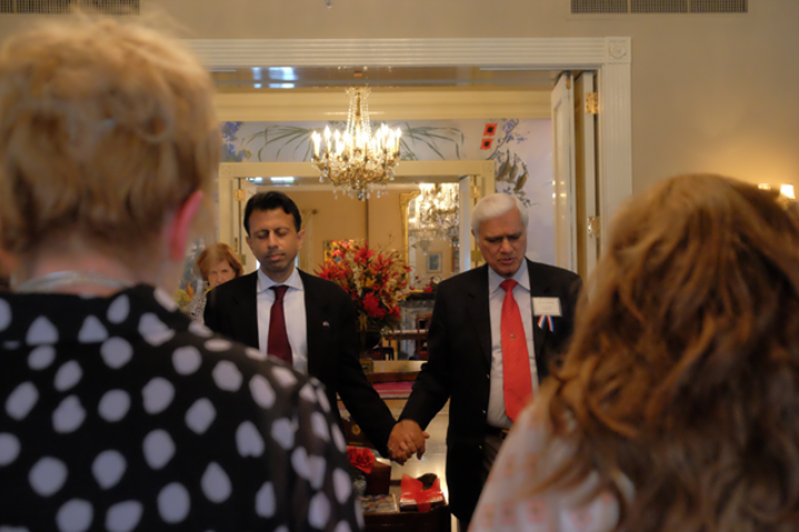
Current Republican presidential candidate and Louisiana Gov. Bobby Jindal is an outspoken conservative, particularly in his opposition to same-sex marriage. Now he has opened up on how he decided to become a practicing Christian.
According to Tyler Bridges of the Acadiana Advocate, Jindal was raised by his Indian parents as a Hindu, going to worship ceremonies known as pujas at the homes of other Indian immigrants in Baton Rogue. Jindal recalled in his 2010 book "Leadership and Crisis" that he and his younger brother, Nikesh, prayed at night to "an all-powerful (Hindu) God who created the universe and was present and active in our daily lives."
"My parents naturally assumed I would remain a Hindu and pass the faith on to the next generation," Jindal wrote.
Bridges reported that Jindal started asking basic questions about the meaning of life after his grandfather's death in India at the end of his sophomore year at Baton Rouge Magnet High School; he also changed his given name from Piyush to Bobby. During an attendance at a math tournament in his junior year, Jindal met Kathy Reznick.
"I had a crush on her, but had never mustered the nerve to say hello," Jindal wrote.
According to Bridges, Jindal worked up the courage to ask her out. A conversation they had in New Orleans struck something within Jindal.
"Things were going great," Jindal wrote. "Here was this pretty girl, and she was interested in me! Then I asked her a simple question that changed everything: 'What do you want to do after school?'"
"I want to become a Supreme Court justice, because I want to save innocent lives," Reznick replied.
"Saving the unborn gave her a purpose in life, something that was missing from mine," Jindal wrote, adding that her answer struck him.
Bridges reported that Reznick attended Most Blessed Sacrament Church in Baton Rouge. Jindal sneaked out of his house to join her in Catholic Mass.
"I didn't want my parents to know, so I was probably the only teenager in Baton Rouge who told his parents he was going to a party so he could sneak off to church," Jindal wrote.
According to Bridges, Jindal also locked himself in his closet with a flashlight to read a Bible, which was given to him by Kent Shih.
"He took a very intellectual and factual approach in wanting to know the answers," Reznick said. "He was very thorough."
However, Jindal's conversion to Christianity would come at an event where Shih performed in a Christian musical at a nondenominational church at LSU. That event also featured the iconic Christian movie "The Jesus Film," which graphically depicted the crucifixion of Jesus by Roman soldiers.
"I had intensely studied that momentous event, yet watching the film, I suddenly realized that Christ was on the cross because of me - my sins - what I had done, what I had failed to do. This was my epiphany," Jindal wrote. "He didn't die for billions, which was so abstract, but because of me. Suddenly, God was tangible. Everything instantly came into focus."
Jindal added that "God chose that moment to reveal Himself to me." He later accepted Christ as his savior and was baptized as a Catholic.
According to Bridges, the future governor was scared that his parents would kick him out of their home and not pay his tuition to Brown University. Jindal later admitted to his parents about his conversion to the Christian faith after wrecking his father's car.
"At first, there was absolutely a strain," Jindal said in an interview. "At first, they were angry about it. Then they wanted to understand: Was this a fad? Was it something I was serious about? Was I doing this for a girl? Why was I doing this? They questioned the motivation behind it."
Jindal added that his parents wanted him to read Hindu texts. After reading them, he remained unconvinced to turn back to Hinduism; Bridges reported that Jindal's parents eventually gave him "their grudging acceptance."
"Over time, I think a couple of things helped," Jindal said. "It wasn't like I came home and told them I had embraced a hedonistic faith that tells me to do whatever I want. I was embracing a faith that teaches me to obey my parents."
While his parents and brother continued practicing Hinduism, Jindal noted that "they saw I was serious about this."
"Over time, they appreciated many of the virtues and commandments of the Christian faith," Jindal said. "They respect the role my faith plays in my life. They've attended my children's baptisms. It took time."
According to Bridges, Jindal was baptized as a Catholic at Brown. However, Jindal did one more Hindu prayer ceremony before marrying his wife, Supriya, in 1997.
"They were married at St. Joseph Cathedral in Baton Rouge," Bridges wrote. "They worship at St. Aloysius and raise their children as Catholics."
As for the people who led Jindal to Christianity, both Shih and Reznick humbly downplayed their roles.
"I'm humbled that anybody could be impacted," Shih said, adding in a follow-up email that "I am cautiously optimistic that I influenced him for the better."
"Any credit for that would belong to God," said Reznick, who now works as a lawyer in Baton Rouge.
According to Isabelle Chapman of AOL, Jindal's conversion to Christianity is "almost unheard of" within the Hindu community in the United States. A Pew study noted that 80 percent of Americans who were raised as Hindu stick with the religion in adulthood, the highest retention rate of any major religion.







